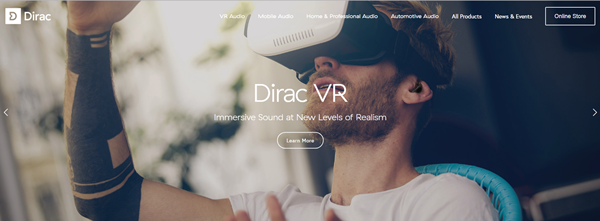Dirac Research is a world-renowned audio technology company on a mission to invent the future of sound. I recently had the pleasure of chatting with Mathias Johansson, CEO and co-founder of Dirac.
- Mathias, let’s hear more about the Dirac story – how did the company get started back in 2001 (a tough period, given the 2000 dotcom crash)?
“We also started out with a modest budget and put in a lot of sweat equity”.
I founded the company together with five colleagues at Uppsala University. We had done extensive research on how to make a small, inexpensive loudspeaker sound like a far bigger and more expensive one without any hardware changes. By digitally compensating for the speaker’s various inefficiencies, we could dramatically improve the sound experience. We won a national business plan contest in Sweden and won a little money to get the company started. Given that the IT bubble had just burst, it was surprising how much interest we received from VC funds, but in the end we decided to work with private investors rather than VCs. We also started out with a modest budget and put in a lot of sweat equity.
- Tell us a bit about evolving market trends – in terms of not only technology, but also buyer behavior, on the corporate side as well as the consumer side.
“Businesses that are not ready to reinvent themselves on an annual basis are bound for irrelevance in this new landscape”.
The smart speaker captures it all – who would have guessed that Amazon would be the number one wireless speaker brand in 2017? The fast adoption of smart speakers and voice control coupled with AI is a trend that will change not just our industry but society at large. It’s a paradigm shift possibly as pivotal as the Internet itself.
On a similar note, established businesses and industries are getting disrupted all over the place because of digital technology, the exceptional prevalence of computing power, and the unparalleled availability of venture capital. Businesses that are not ready to reinvent themselves on an annual basis are bound for irrelevance in this new landscape. And this holds equally true for large corporations as for small businesses.
- What do you think is the number one thing that positively impacted your business in these last 15+ years?
The exponential decrease of computing costs and the following prevalence of digital chipsets in every kind of consumer device. With this, our technology can be embedded wherever there’s sound reproduction, which was not possible in the analog era.
- What about online sales? You are currently selling your products in about 30 countries via your online store, and these are mainly consumer purchases. Can you comment on how this channel has evolved from your perspective over the years?
“In a few years […] B2B licensees [might] want to let consumers buy upgrades to their audio functionality through online purchases”.
From a Dirac specific perspective, it was first a marketing channel. Our B2C business helped generate reviews of our sound technology in HiFi press and this in turn led to increased B2B licensing. But in a few years, consumer upgrades might actually become a considerable part of our business as our B2B licensees want to let consumers buy upgrades to their audio functionality through online purchases and over the air updates. We also see other interesting venues for online sales, but that takes us into parts of our business strategy that we don’t yet want to disclose…
- Your personal trajectory is also interesting – from an M.Sc. in Information Technology, to a Ph.D. in Signal Processing, to co-founder and later CEO of Dirac. As you say in your LinkedIn profile, “life is full of unexpected turns.” What triggered these changes for you?
“Building a company is the most fun of all. It’s all about making an idea come alive”.
Signal processing was the last thing I wanted to study but it was a mandatory class. Unexpectedly, it turned out to be truly fascinating. I had great professors who made me realize what endless innovation can be done with digital signal processing. It’s the engineering of mimicking a brain! That led me to do a Master’s thesis on improving loudspeakers with digital signal processing, which then led me to found the company with my colleagues while pursuing a Ph.D. As sure as I had been about signal processing being boring, managing a company was the last thing I ever wanted to do. I just wanted to take our idea to reality and make it happen, then go on to invent something else.
Well, then came the financial crisis in 2008-2009 and our CEO at the time got a stress-related health problem. At that time, I had spent 7 years helping build this company and I was frustrated with our progress. So when I was asked to run the company, I felt it was about time to change this. To make it happen I had to be in charge of overall operations. We just needed to change a few things to make it happen and conquer the world… So that’s what I set out to do, and what I now realize eight years later is that building a company is the most fun of all. It’s all about making an idea come alive, which is the same thing that inspired me to go into signal processing research in the first place.
- Related to the previous question, what do you think are the qualities of a successful technology start-up CEO?
“You need two things primarily [to be a successful start-up CEO]: ambition and competence, in equal proportions”.
You need two things primarily: ambition and competence, in equal proportions. First you need to have very high ambitions in life and for your technology. Then you have to make it happen, and for that you really need to be very competent and execute very well. It’s about knowing where you want to go, and then it’s all execution. A technology start-up CEO also needs real product know-how but must see things from the customer perspective. A bit of paranoia and a bit of megalomania might actually help too.
- You are licensing Dirac technologies for use in automotive, mobile and home entertainment audio systems. What’s next in terms of development and markets?
Earlier this year we launched Dirac VR, which already won the Best VR Industry Technology Award at TechXLR8 at the London Tech Week. VR and AR applications will generally have higher requirements on audio than other applications, and although the VR/AR industry is still in its infancy it has huge potential.
Thank you so much, Mathias, I look forward to seeing Dirac taking this to the next stage!






